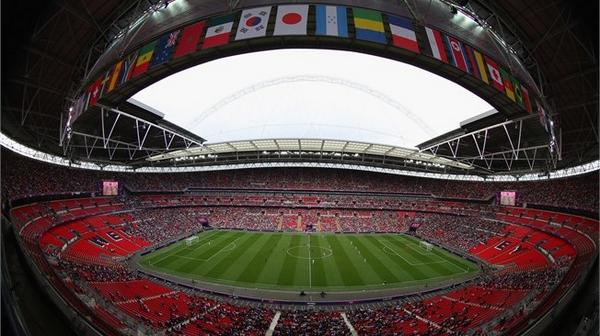By Andrew Warshaw in Geneva
September 19 – After two humiliating failures in trying to secure the World Cup, English football can at last celebrate victory after being handed the climax to the one-off pan-European Championship finals in 2020.
UEFA’s executive committee as expected selected Wembley today to host the prestige final and semifinal after it emerged that Munich, its only rival, withdrew on the morning of the vote in downtown Geneva as part of a strategic gamble to stage the tournament on its own four years later in 2024.
Ahead of the ballot, top German officials had hinted they might leave the path free to Wembley if in return England supports its bid to host the tournament in 2024, when the finals return to the single-host format.
That’s exactly what happened with the Germans opting instead to downgrade their interest in the 13-city, so-called “Euro for Europe” – brainchild of UEFA president Michel Platini – by instead going for a less prestigious package earlier in the tournament.
As a result, UEFA’s exco voted unanimously for Wembley to host the showpiece finale though of course England would only benefit directly if they qualify. Munich was handed a group stage and quarter final host spot.
The new format gave a chance for countries that wouldn’t necessarily have a chance to host the tournament on their own to stage some games and Platini said: “This is a historic moment because we’ll be able to bring this competition to all the countries of Europe and especially to countries that would never otherwise have the chance to host such a competition.”
Twelve cities will stage three group games each plus a knockout match in what will be the first ever continent-wide finals, split into regional zones. Munich, Rome, Baku and St Petersburg were the four chosen to host a quarterfinal because they have stadia with a capacity of 60,000 or more. The other hosts will be Copenhagen (Denmark), Bucharest (Romania), Amsterdam (Netherlands), Dublin (Ireland), Bilbao (Spain), Budapest (Hungary), Brussels (Belgium) and Glasgow (Scotland).
“I know the party side of London, the way the English welcome people,” said Platini who conceived the format partly to celebrate the 60th anniversary of the tournament and partly because so few nations can afford to stage the expanded 24-team event, starting next year, on their own.”Wembley will doubtless live up to the responsibility. This was a dream, now it has become a reality.”
The last time England won a football bid of such magnitude was for Euro ’96 at the old Wembley. The venue has been rebuilt since then into a 90,000-capacity stadium, and has staged two Champions League finals in the past three years.
“This bidding process was open to more than 50 UEFA countries so for Wembley to be ultimately recognised in this way is testament to a lot of hard work behind the scenes,” said English FA chairman Greg Dyke, “Obviously we are delighted. It’s nice to win one for a change.”
With no single host nation, UEFA have yet to decide where to stage the opening game or where England would play in the group phase if it qualifies.
Many of those selected are experienced hosts of major sporting events but this is the first time cities like Baku, Budapest or Bucharest will host such a big tournament. The stadia in Budapest and Baku are not built yet.
Altogether 19 candidate cities put their names forward and of the six who missed out, the greatest surprise was Cardiff, which recently staged the Super Cup and had been widely expected to get the nod ahead of Glasgow after an almost flawless technical report but which ultimately failed to make it by one single point after exco members listed their preferences in order of priority.
Glasgow was the final envelope opened by Michel Platini and brought a gasp of surprise from the packed audience. Whilst the Scots celebrated, the Welsh delegation appeared utterly crestfallen . “We are naturally bitterly disappointed,” said a Welsh FA spokesman.
An official Welsh FA statement added: “We believed that the Millennium Stadium, with its 74,154 capacity and extensive Skybox and hospitality facilities, would have been an ideal venue for UEFA EURO 2020 and provide UEFA with significant revenues. In addition, we proposed strong transport and accommodation plans given that four international airports are located within two hours of Cardiff and that we secured accommodation for 41,000 supporters, all in areas covered by the FAW’s free travel commitment. We also proposed that any surplus generated from Cardiff hosting UEFA EURO 2020 matches would have been invested into community football projects throughout Wales. But we of course respect UEFA’s decision.
“The FAW would like to thank all the partners that worked so hard to support Cardiff’s bid. While they, like us, will be disappointed with today’s news, there is much to be positive about Welsh football as we look to the future.
Contact the writer of this story at moc.l1744470071labto1744470071ofdlr1744470071owedi1744470071sni@w1744470071ahsra1744470071w.wer1744470071dna1744470071

